Around the world, an increasing number of countries have decided to phase out coal, both to achieve their climate targets, but also to modernise their electricity sector in the transition from fossil to renewable energy supply. This includes Germany, which long had one of the highest shares of coal use in Europe – and Chile, as one the first Latin American country to move beyond coal. To support the dialogue in the Chilean-German Energy Partnership, Ecologic Institute, Agora Energiewende and Chilean experts were commissioned to draft a paper comparing the coal phase-out processes in both countries.
In 2019, the German Federal Ministry for Economic Affairs and Energy and the Chilean Ministry of Energy signed a declaration of intent to found the Energy Partnership Chile-Alemania. Under this Partnership, a working group on coal phase-out and renewable phase-in was established in January 29. As input to the working group, Agora Energiewende, Ecologic Institute and Chilean experts produced a comparison should produce a comparative analysis of the economic circumstances and the political processes leading to the coal-phase-out decisions in both countries.
The Ecologic Institute contributed the case study on the German coal phase-out, and identified key outcomes and findings for the comparative analysis between Germany and Chile. The German case studied looked at the role of coal in the German energy system, the increasingly conflicted role of coal against Germany's energy transition and its climate ambition, and the process leading up to the coal phase-out decision. In particular, the case study discussed the Commission on Growth, Structural Change and Employment (better known as the "coal commission") that developed its recommendations from June 2018 to February 2019, and the political implementation of the Commission’s recommendations since then.





